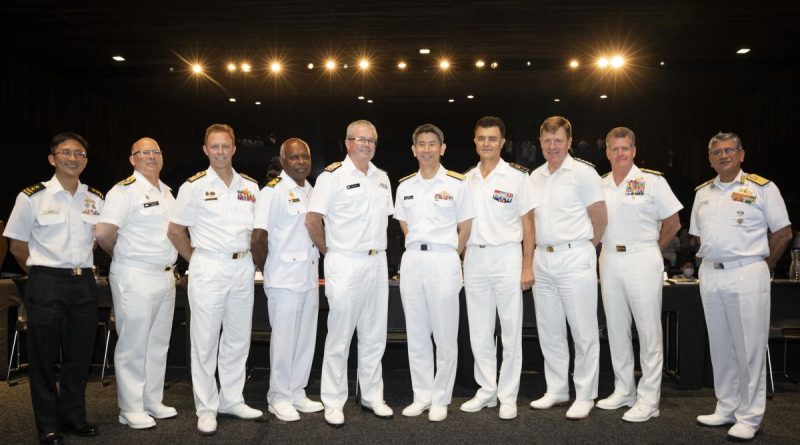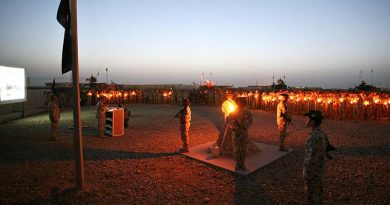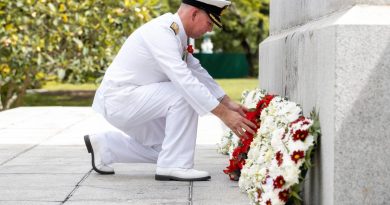Sea Power: Nations share common vision on Indo-Pacific security
Share the post "Sea Power: Nations share common vision on Indo-Pacific security"

Maritime leaders from nine nations joined Australia’s Chief of Navy, Vice Admiral Michael Noonan, at the Indo-Pacific Sea Power 2022 conference in outlining common opportunities to jointly enhance maritime security in the Indo-Pacific.
CAPTION: Military personnel from Singapore, Canada, Australia, Papua New Guinea, New Zealand, Japan, France, the United Kingdom and the United States of America at Session 2 of the Sea Power conference in Sydney. Story by Natalie Staples. Photo by Leading Seaman Daniel Goodman.
Representatives from Canada, France, India, Japan, New Zealand, Papua New Guinea, Singapore, the United States and the United Kingdom spoke about their shared security challenges and how the navies of those countries have engaged in the Indo-Pacific.
Vice Admiral Noonan opened the session and outlined the importance of the Indo-Pacific to security and global prosperity.
“[The region] comprises at least 38 countries, and shares 44 percent of the world’s surface and about 65 percent of the world’s population. It counts for 62 percent of global GDP and 46 percent of the world’s merchandise trade,” Vice Admiral Noonan said.
“In this idiosyncratic maritime region, seven out of the top 10 largest navies in the world are Indo-Pacific.
“The busiest international sea lanes are in our region as are nine of the world’s 10 busiest sea ports.
“When it comes to maritime commons, a commonality of purpose is what will enable prosperity and security for all.”
Discussions included the strategic realignment in the Indo-Pacific and geopolitical environment, along with challenges ranging from illegal fishing and immigration, threats posed by climate change, criminal activity, grey-zone tactics and an incremental disregard of the rules-based order.
The commonality of purpose shared by each nation and the importance of working together in the maritime domain to provide a peaceful, prosperous, secure and stable Indo-Pacific were part of the discussions.
Chief of Staff of the Japan Maritime Self Defense Force, Admiral Ryo Sakai, said collective cooperation was key.
“In order to maintain a rules-based order in the vast ocean, and to ensure peace and security in the region, cooperation among allies and like-minded countries is indispensable,” Admiral Sakai said.
“The entire international community must work together to discourage unilateral attempts to change the status quo by force and prevent conflict from occurring.”
Singapore’s Chief of Navy, Rear Admiral Aaron Beng, agreed cooperation was important.
“It is sensible and reasonable that we significantly enhance and reinvigorate regional cooperation,” Rear Admiral Aaron Beng said.
“The key reason for this is the range and number of threats will undoubtedly continue to grow beyond the capability of any navy or maritime force to go it alone.”
Commander of United States Pacific Fleet, Admiral Samuel Paparo, picked up on a comment in the speech of Deputy Chief of the Papua New Guinea Defence Force, Commodore Philip Polewarra, that reflected on a common humanity.
“Beyond our capabilities, it is our humanity and our partnerships that are an essential asymmetric advantage,” Admiral Paparo said.
At the end of the session, Vice Admiral Noonan reflected on the points made by the speakers.
“What we came to talk about was commonality of purpose. What we see here is a commonality of vision and commitment,” Vice Admiral Noonan said.
.
.

.
.
Share the post "Sea Power: Nations share common vision on Indo-Pacific security"





